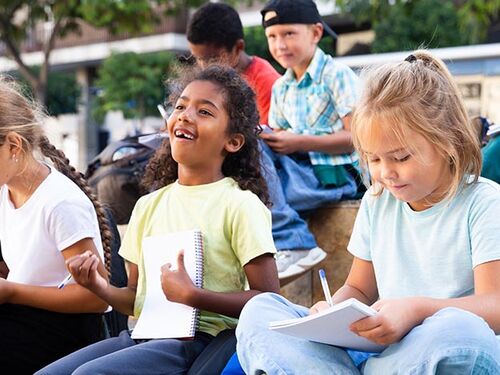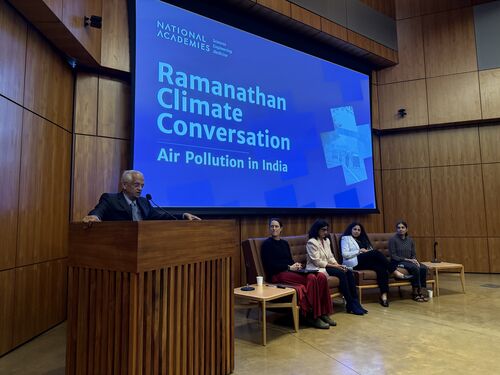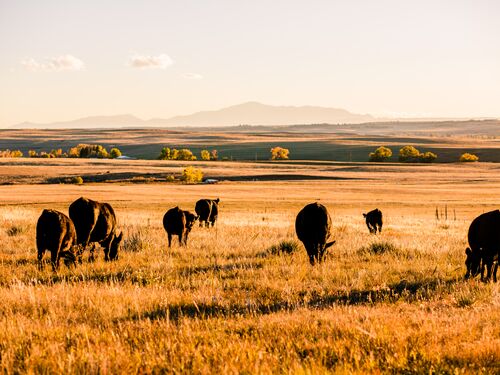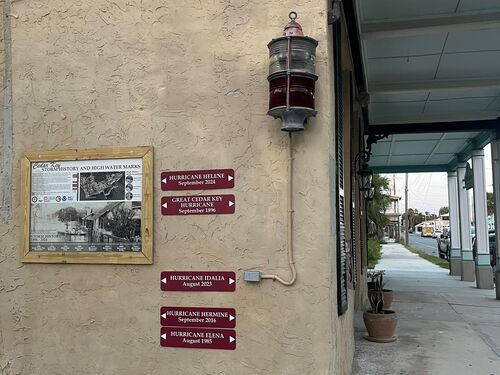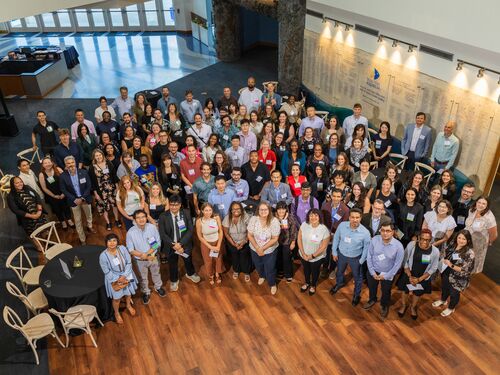Gulf Research Program Awards $2 Million for Empowering K-8 Youth Through Place-Based Education Projects and Programs
Program News
By Pete Nelson
Last update August 24, 2023
WASHINGTON ― The Gulf Research Program (GRP) of the National Academies of Sciences, Engineering, and Medicine today announced awards totaling $2 million to support eight projects that engage children and youth in place-based educational activities to foster the development of scientific and environmental skills that are critical to solving complex issues in the Gulf region now and into the future.
These projects will help connect young learners across the Gulf of Mexico region with local environmental issues through such diverse activities as exploring wastewater issues in rural Alabama, training Florida teachers to incorporate place-based learning into their lessons, involving Texas students in citizen science projects to monitor the environment, providing rural Mississippi students with experiential education, and connecting urban Louisiana students with their local watersheds and wetlands. All eight proposals seek to help students develop a deeper connection to place, improve their scientific and environmental literacy, and work toward the betterment of the region at large.
“The goal of these grants is to empower young learners through place-based education, an interdisciplinary, student-centered, inquiry-driven teaching and learning practice situated in the local community and environment,” said Karena Mary Mothershed, senior program manager for the GRP’s Board on Gulf Education and Engagement. “These eight projects have a high potential to create long-lasting impacts on underserved students in grades K-8 across the Gulf of Mexico region, enabling them to consider and address environmental challenges impacting their own communities.”
The awarded projects, in alphabetical order by project title, are:
Experiential Place-Based Environmental Literacy in the Mississippi Delta
Project Director: Amanda Delperdang
PD Organization: Mississippi Delta Nature and Learning Center
Project Location: Leland, Mississippi
Anticipated Budget: $236,772.40
Project Summary: Children ages 5-15 in the Mississippi Delta will be provided with hands-on educational experiences that teach them about environmental stewardship in their community. The purpose of the program is to connect children and youth to nature rather than teaching them abstract concepts in a standard classroom setting. With the increased use of technology in classrooms, students in the Mississippi Delta spend less time engaging with the natural world, sometimes even regularly skipping recess due to testing concerns and cutting science instruction short to focus on tested subjects. This program will provide children with experiential science learning opportunities through field trips, summer camps, and weekly programming. The program will take place at the Mississippi Delta Nature and Learning Center, a 30-acre piece of land with an outdoor children’s garden, trails, and wildflower meadows. Activities in the program are hands-on and student-led designed around the Mississippi College and Career Readiness Standards.
OCEANS (Oceanography, Conservation, Ecology, Arts, Nature, and Stewardship): Building Resilience Through Place-Based Learning
Project Director: Katie Doyle
PD Organization: Flour Bluff Independent School District
Project Location: Corpus Christi, Texas
Anticipated Budget: $472,679
Project Summary: OCEANS (Oceanography, Conservation, Ecology, Arts, Nature, and Stewardship): Building Resilience Through Place-Based Learning will be implemented in K-8 grades of Flour Bluff Independent School District, which is comprised primarily of minority students from economically disadvantaged homes who are at high risk of dropping out of the educational system. OCEANS will educate, inspire, and empower students, teachers, and community stakeholders to protect their environment. This will be achieved by 1) enriching learning with place-based citizen science/stewardship projects that build capacity with cross-generational knowledge from community partners; 2) integrating place-based OCEANS-themed curriculum in K-8 classrooms; 3) empowering older students to be environmental ambassadors to younger students through place-based, hands-on activities; and 4) drafting an Environmental Stewardship and Literacy Plan for the community that supports resiliency. OCEANS will complement formal state-wide education learning objectives and increase STEM literacy specific to our underrepresented community by developing a sense of community ownership and awareness of unique coastal resources.
Rural Water Education Partnership for Place-Based STEM Learning in Out-of-School Programs
Project Director (PD): Christopher Spencer
PD Organization: Black Belt Community Foundation
Project Location: Selma, Alabama
Anticipated Budget: $287,832
Project Summary: The Rural Water Education Partnership is composed of the Black Belt Community Foundation, University of Alabama, and Hale County School System with the shared goal to promote STEM literacy and workforce readiness for students in grades 6-8 through hands-on, engaging STEM learning, student-initiated research projects, and advocacy opportunities based on cutting-edge water and wastewater research already occurring in students’ communities. It will also promote STEM skills and career awareness for the participant teachers and provide opportunities for STEM researchers to build their skills and capacity for educational outreach and public communication of science.
Suwannee Watershed: Assessment and Monitoring of Place to Gain Understanding of Local Flow (SWAMP to GULF)
Project Director: Lacey Huffling
PD Organization: Georgia Southern University
Project Location: Statesboro, Georgia (project work in north central Florida)
Anticipated Budget: $465,335
Project Summary: The purpose of SWAMP to GULF is to develop a Florida place-based professional development opportunity for middle school science teachers that builds on the Okefenokee Swamp place-based professional development opportunity, Our2Swamp. Florida teachers will be trained to monitor local watershed conditions and examine the health and resilience of local ecosystems along the Gulf through research service learning. Teachers will integrate place-based citizen science projects, such as Adopt-a-Stream, and create inquiry and design thinking lessons to increase students’ understanding of human and climate impacts on local watersheds on the Gulf of Mexico.
A Watershed Event (AWE): Empowering K-8 Youth through Place-Based Education
Project Director: Donna Ellen Granger
PD Organization: Florida State University
Project Location: Tallahassee, Florida
Anticipated Budget: $117,443
Project Summary: The project will be centered around the Apalachee Bay in the Gulf of Mexico and its watershed. Field investigations for students and their teachers will be held at the FSU Coastal and Marine Laboratory at Turkey Point in Franklin County. Thus, the target audience is students from a five-county region that borders this watershed, and by extension their teachers and parents. The goal of the project is to build understanding of environmental issues in and promote stewardship of the Gulf and its watershed among students through meaningful science educational experiences. To maximize students’ formal education experience, teachers must become facilitators of learning in which students themselves develop the science concepts with teachers as guides scaffolding the learning by carefully sequencing learning experiences and investigations, asking questions to engage students in sense making, and building on student ideas. To aid in the shift to this type of instruction, professional development for teachers will also be provided.
Watersheds, Wetlands, and Urban Ecology: New Orleans East Youth Envision the Future for Their Community
Project Director: Diane Maygarden
PD Organization: University of New Orleans
Project Location: New Orleans, Louisiana
Anticipated Budget: $242,596
Project Summary: This interdisciplinary project will engage approximately 800 secondary school students in grades 5 through 7, their teachers, and community members in East New Orleans in place-based education focused on exploring their connections to the wetlands and watershed surrounding their neighborhood and school and the role these surrounding wetlands play in ecological and community health. Project collaborators will engage students in inquiry and project-based multidisciplinary educational programming in their school, community, and at Bayou Sauvage Urban National Wildlife Refuge and other green spaces. Classroom and outdoor science inquiry learning activities geared to Louisiana state curriculum standards will enable program participants to gain skills and knowledge in the application of hands-on science. Students and teachers will explore the interconnectivity between their community and the surrounding environment through visits to a variety of local sites to learn how human communities are intricately linked to natural communities and ecosystems.
Wetland Days: Watershed-Based Enrichment Opportunities for Youth
Project Director: Dani DiIullo
PD Organization: Louisiana Sea Grant (hosted at Louisiana State University)
Project Location: Baton Rouge, Louisiana
Anticipated Budget: $88,800
Project Summary: Wetland Days are single-day, place-based field experiences that are customized to both the local habitat of the participating public schools and the needs of the K-8 teachers and administrators from the school system. Through immersive place-based activities and investigations, Louisiana Sea Grant seeks to build environmental literacy using applied learning that supports classroom instruction. Wetland Days are customizable opportunities that allow schools to build a placed-based field investigation (from a menu of choices) that will be age-appropriate, standards-aligned, and contain sound science. Sea Grant will take on the financial, instructional, and logistical challenges that are inherent to off-campus learning. This will allow the teachers to focus on classroom instruction, with the knowledge that Wetland Days will serve as a tool to apply that information in a local setting. This project seeks to enhance the environmental literacy of over 1,000 Louisiana public school students through the co-creation of place-based educational opportunities.
Youth Wetlands Education Project
Project Director: Rashida Ferdinand
PD Organization: Sankofa Community Development Corp.
Project Location: New Orleans, Louisiana
Anticipated Budget: $150,000
Project Summary: The Sankofa Community Development Corp. Youth Wetlands Education Project, located in the vulnerable Lower Ninth Ward community of New Orleans, creates a framework for ecology education, nature-to-classroom connections, and equitable access to nature that will ignite K-8 students’ knowledge of our environmental challenges in Southern Louisiana, and will provide educators with key professional development opportunities. Utilizing Sankofa’s Wetland Park and Nature Trail — our 40-acre green infrastructure and wetland restoration initiative — the project will: 1) develop and expand a variety of environmental education field studies aligned with the state content school standards; 2) offer structured experiences that integrate ecology, natural history, health and wellness, art, and local history, giving students important time not only to explore nature but also to build on key concepts as they advance through grades; 3) host educators from New Orleans Public Schools and provide them with environmental lesson plans and professional development opportunities; and 4) engage ecologists, naturalists, and scientists from Louisiana and around the country who utilize the Wetland Park as space for research and coastal restoration studies.
Experiential Place-Based Environmental Literacy in the Mississippi Delta
Project Director: Amanda Delperdang
PD Organization: Mississippi Delta Nature and Learning Center
Project Location: Leland, Mississippi
Anticipated Budget: $236,772.40
Project Summary: Children ages 5-15 in the Mississippi Delta will be provided with hands-on educational experiences that teach them about environmental stewardship in their community. The purpose of the program is to connect children and youth to nature rather than teaching them abstract concepts in a standard classroom setting. With the increased use of technology in classrooms, students in the Mississippi Delta spend less time engaging with the natural world, sometimes even regularly skipping recess due to testing concerns and cutting science instruction short to focus on tested subjects. This program will provide children with experiential science learning opportunities through field trips, summer camps, and weekly programming. The program will take place at the Mississippi Delta Nature and Learning Center, a 30-acre piece of land with an outdoor children’s garden, trails, and wildflower meadows. Activities in the program are hands-on and student-led designed around the Mississippi College and Career Readiness Standards.
OCEANS (Oceanography, Conservation, Ecology, Arts, Nature, and Stewardship): Building Resilience Through Place-Based Learning
Project Director: Katie Doyle
PD Organization: Flour Bluff Independent School District
Project Location: Corpus Christi, Texas
Anticipated Budget: $472,679
Project Summary: OCEANS (Oceanography, Conservation, Ecology, Arts, Nature, and Stewardship): Building Resilience Through Place-Based Learning will be implemented in K-8 grades of Flour Bluff Independent School District, which is comprised primarily of minority students from economically disadvantaged homes who are at high risk of dropping out of the educational system. OCEANS will educate, inspire, and empower students, teachers, and community stakeholders to protect their environment. This will be achieved by 1) enriching learning with place-based citizen science/stewardship projects that build capacity with cross-generational knowledge from community partners; 2) integrating place-based OCEANS-themed curriculum in K-8 classrooms; 3) empowering older students to be environmental ambassadors to younger students through place-based, hands-on activities; and 4) drafting an Environmental Stewardship and Literacy Plan for the community that supports resiliency. OCEANS will complement formal state-wide education learning objectives and increase STEM literacy specific to our underrepresented community by developing a sense of community ownership and awareness of unique coastal resources.
Rural Water Education Partnership for Place-Based STEM Learning in Out-of-School Programs
Project Director (PD): Christopher Spencer
PD Organization: Black Belt Community Foundation
Project Location: Selma, Alabama
Anticipated Budget: $287,832
Project Summary: The Rural Water Education Partnership is composed of the Black Belt Community Foundation, University of Alabama, and Hale County School System with the shared goal to promote STEM literacy and workforce readiness for students in grades 6-8 through hands-on, engaging STEM learning, student-initiated research projects, and advocacy opportunities based on cutting-edge water and wastewater research already occurring in students’ communities. It will also promote STEM skills and career awareness for the participant teachers and provide opportunities for STEM researchers to build their skills and capacity for educational outreach and public communication of science.
Suwannee Watershed: Assessment and Monitoring of Place to Gain Understanding of Local Flow (SWAMP to GULF)
Project Director: Lacey Huffling
PD Organization: Georgia Southern University
Project Location: Statesboro, Georgia (project work in north central Florida)
Anticipated Budget: $465,335
Project Summary: The purpose of SWAMP to GULF is to develop a Florida place-based professional development opportunity for middle school science teachers that builds on the Okefenokee Swamp place-based professional development opportunity, Our2Swamp. Florida teachers will be trained to monitor local watershed conditions and examine the health and resilience of local ecosystems along the Gulf through research service learning. Teachers will integrate place-based citizen science projects, such as Adopt-a-Stream, and create inquiry and design thinking lessons to increase students’ understanding of human and climate impacts on local watersheds on the Gulf of Mexico.
A Watershed Event (AWE): Empowering K-8 Youth through Place-Based Education
Project Director: Donna Ellen Granger
PD Organization: Florida State University
Project Location: Tallahassee, Florida
Anticipated Budget: $117,443
Project Summary: The project will be centered around the Apalachee Bay in the Gulf of Mexico and its watershed. Field investigations for students and their teachers will be held at the FSU Coastal and Marine Laboratory at Turkey Point in Franklin County. Thus, the target audience is students from a five-county region that borders this watershed, and by extension their teachers and parents. The goal of the project is to build understanding of environmental issues in and promote stewardship of the Gulf and its watershed among students through meaningful science educational experiences. To maximize students’ formal education experience, teachers must become facilitators of learning in which students themselves develop the science concepts with teachers as guides scaffolding the learning by carefully sequencing learning experiences and investigations, asking questions to engage students in sense making, and building on student ideas. To aid in the shift to this type of instruction, professional development for teachers will also be provided.
Watersheds, Wetlands, and Urban Ecology: New Orleans East Youth Envision the Future for Their Community
Project Director: Diane Maygarden
PD Organization: University of New Orleans
Project Location: New Orleans, Louisiana
Anticipated Budget: $242,596
Project Summary: This interdisciplinary project will engage approximately 800 secondary school students in grades 5 through 7, their teachers, and community members in East New Orleans in place-based education focused on exploring their connections to the wetlands and watershed surrounding their neighborhood and school and the role these surrounding wetlands play in ecological and community health. Project collaborators will engage students in inquiry and project-based multidisciplinary educational programming in their school, community, and at Bayou Sauvage Urban National Wildlife Refuge and other green spaces. Classroom and outdoor science inquiry learning activities geared to Louisiana state curriculum standards will enable program participants to gain skills and knowledge in the application of hands-on science. Students and teachers will explore the interconnectivity between their community and the surrounding environment through visits to a variety of local sites to learn how human communities are intricately linked to natural communities and ecosystems.
Wetland Days: Watershed-Based Enrichment Opportunities for Youth
Project Director: Dani DiIullo
PD Organization: Louisiana Sea Grant (hosted at Louisiana State University)
Project Location: Baton Rouge, Louisiana
Anticipated Budget: $88,800
Project Summary: Wetland Days are single-day, place-based field experiences that are customized to both the local habitat of the participating public schools and the needs of the K-8 teachers and administrators from the school system. Through immersive place-based activities and investigations, Louisiana Sea Grant seeks to build environmental literacy using applied learning that supports classroom instruction. Wetland Days are customizable opportunities that allow schools to build a placed-based field investigation (from a menu of choices) that will be age-appropriate, standards-aligned, and contain sound science. Sea Grant will take on the financial, instructional, and logistical challenges that are inherent to off-campus learning. This will allow the teachers to focus on classroom instruction, with the knowledge that Wetland Days will serve as a tool to apply that information in a local setting. This project seeks to enhance the environmental literacy of over 1,000 Louisiana public school students through the co-creation of place-based educational opportunities.
Youth Wetlands Education Project
Project Director: Rashida Ferdinand
PD Organization: Sankofa Community Development Corp.
Project Location: New Orleans, Louisiana
Anticipated Budget: $150,000
Project Summary: The Sankofa Community Development Corp. Youth Wetlands Education Project, located in the vulnerable Lower Ninth Ward community of New Orleans, creates a framework for ecology education, nature-to-classroom connections, and equitable access to nature that will ignite K-8 students’ knowledge of our environmental challenges in Southern Louisiana, and will provide educators with key professional development opportunities. Utilizing Sankofa’s Wetland Park and Nature Trail — our 40-acre green infrastructure and wetland restoration initiative — the project will: 1) develop and expand a variety of environmental education field studies aligned with the state content school standards; 2) offer structured experiences that integrate ecology, natural history, health and wellness, art, and local history, giving students important time not only to explore nature but also to build on key concepts as they advance through grades; 3) host educators from New Orleans Public Schools and provide them with environmental lesson plans and professional development opportunities; and 4) engage ecologists, naturalists, and scientists from Louisiana and around the country who utilize the Wetland Park as space for research and coastal restoration studies.
The National Academies’ Gulf Research Program is an independent, science-based program founded in 2013 as part of legal settlements with the companies involved in the 2010 Deepwater Horizon disaster. It seeks to enhance offshore energy system safety and protect human health and the environment by catalyzing advances in science, practice, and capacity to generate long-term benefits for the Gulf of Mexico region and the nation. The program has $500 million for use over 30 years to fund grants, fellowships, and other activities in the areas of research and development, education and training, and monitoring and synthesis.
The National Academies of Sciences, Engineering, and Medicine are private, nonprofit institutions that provide independent, objective analysis and advice to the nation to solve complex problems and inform public policy decisions related to science, engineering, and medicine. They operate under an 1863 congressional charter to the National Academy of Sciences, signed by President Lincoln.
Contact:
Pete Nelson, Director of Communications
Gulf Research Program
PNelson@nas.edu
More like this
Discover
Events
Right Now & Next Up
Stay in the loop with can’t-miss sessions, live events, and activities happening over the next two days.
NAS Building Guided Tours Available!
Participate in a one-hour guided tour of the historic National Academy of Sciences building, highlighting its distinctive architecture, renowned artwork, and the intersection of art, science, and culture.
